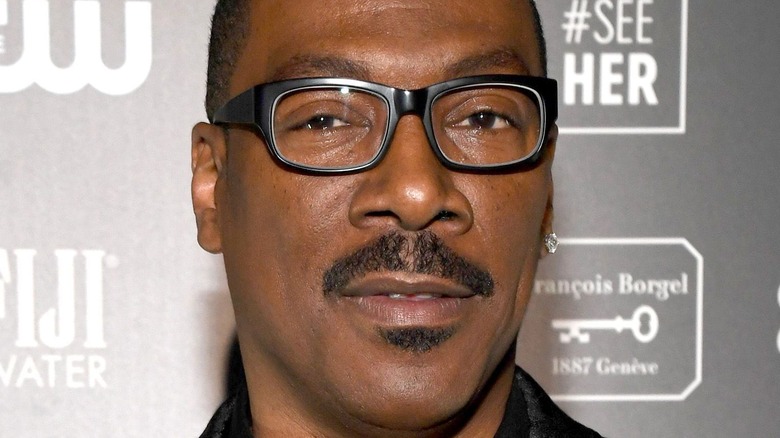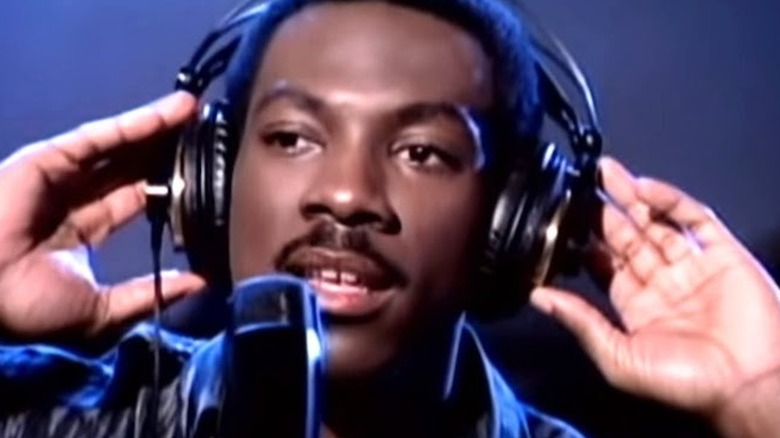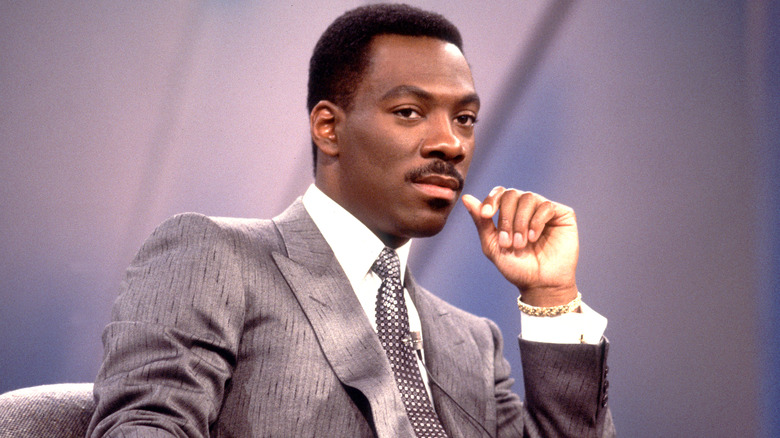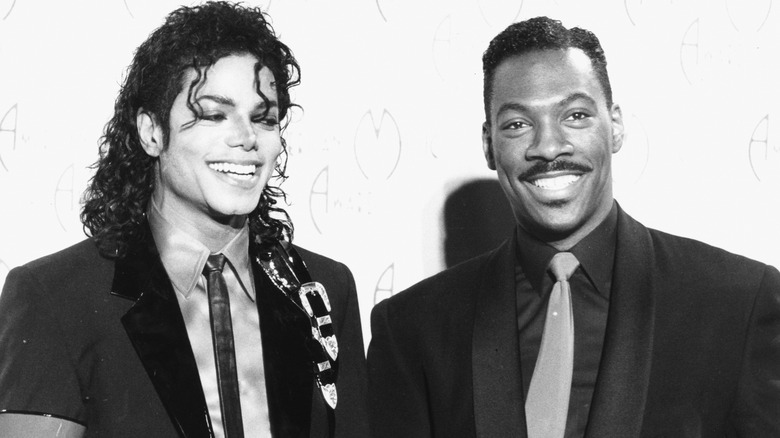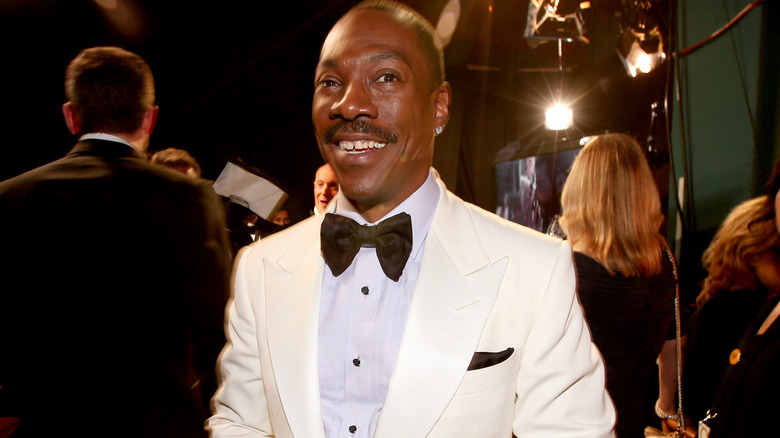Eddie Murphy's Music Career Was Actually More Successful Than You Thought
Most of us know Eddie Murphy for being one of the funniest people to grace the big screen, as arguably best evidenced by his roles in the "Beverly Hills Cop" series, "Coming to America," and the 1996 remake of "The Nutty Professor." But the man behind Axel Foley, Prince (later King) Akeem, Sherman Klump, and dozens of other memorable characters is more than just a talented comedian and actor — he also dipped his toes into the world of music more than a few times throughout his performing career.
In 1982, Murphy, then barely out of his teens and already one of America's most promising comics, released a self-titled stand-up comedy album with two parody songs, including a pastiche of early rap music called "Boogie in Your Butt." To most casual observers, it may have seemed like a fun little side project for someone who was mainly known as a rising star on "Saturday Night Live." But as Murphy revealed to The New York Times in 1984, music was actually his first love. ”I organized my own bands when I was in high school on Long Island,” he recalled. ”I was singing before I did comedy. I would do tunes by the Commodores, some by Earth, Wind and Fire, and then I'd do impressions of Al Green, or Elvis Presley."
Following the release of his debut album, Murphy set his sights on recording a more conventional album with actual songs. But just how successful was he as a musician?
Murphy had a No. 2 hit in 1985 with the Rick James-penned Party All the Time
"How Could It Be," released in 1985, was Eddie Murphy's debut musical album, and while it got lukewarm reviews well after the fact from the likes of AllMusic, which gave it only 2.5 stars out of 5, the record featured a pretty big hit single in "Party All the Time." The song made it all the way to No. 2 on the Billboard Hot 100 and was only prevented from reaching the top spot by Lionel Richie's "Say You, Say Me," as noted by Vibe. That's not bad at all for someone who was, and is still best known as an actor, though he wasn't the only young Hollywood star dabbling in music and doing quite well on the charts during that era — a pre-John McClane Bruce Willis placed a trifecta of covers on the Hot 100 in 1987, including his version of the Staple Singers' "Respect Yourself," which peaked at No. 5.
Probably the most interesting thing about "Party All the Time" is the fact that it was written and produced by a certified funk and R&B icon. Before he lent his name to the song's credits, Rick James' musical career was petering out, and it wasn't helping that he was fresh off a bitter feud with Prince. As Murphy initially worked with Prince before the latter took his prodigious talents elsewhere, James allegedly took advantage of the situation, took Murphy under his wing in the studio, and let his anger toward Prince fuel his drive to make a hit out of "Party All the Time."
Party All the Time doesn't get love from a lot of music fans these days
While undeniably catchy, "Party All the Time" hasn't exactly aged that well — not because of its lyrics but rather because of its apparent unpopularity among music fans in far more recent years. For one, New York Post readers voted Eddie Murphy's biggest hit as one of the 20 worst songs of all time, ranking it alongside the Baha Men's "Who Let the Dogs Out," Starship's "We Built This City," and Rick Dees and his Cast of Idiots' "Disco Duck." Yeah, those NY Post readers certainly chose some bangers in that 2016 survey.
YouTube music critic Todd in the Shadows was another contemporary source who didn't feel like partying all the time when looking back on the song's legacy. In his "One Hit Wonderland" episode on "Party All the Time," Todd criticized Murphy for sounding little like what fans of his work on "Saturday Night Live" would expect. "The man did great impressions of James Brown, Stevie Wonder, Michael Jackson ... and yet, the man he's choosing to emulate is apparently Lionel Richie? Why would you want to do that?"
It wasn't like most of the other songs on "How Could It Be" were any better for modern critics. AllMusic wrote that overall, Murphy "didn't possess the [vocal] chops" to make it as a serious musician, though the site did credit him for having a diverse range of influences on the album. Vibe, on the other hand, felt this was a double-edged sword, as the publication posited that Murphy didn't have a definitive sound and was generally "all over the place" when it came to his musical direction.
Technically, Murphy was not a one-hit wonder
Although "Party All the Time" was indeed featured on a YouTube series that focuses on one-hit-wonders, Eddie Murphy is, in the truest sense, not a one-hit-wonder. Four years after he nearly topped the pop charts with a song about a girlfriend who can't stop partying, Murphy was back on the Top 40 in 1989 with "Put Your Mouth on Me," the lead-off track from his sophomore musical album, "So Happy." The song was substantially less successful than "Party All the Time," but it still peaked at a respectable No. 27 in September 1989.
Despite the diminishing returns from his second non-stand-up record, Murphy released yet another musical album in 1993, "Love's Alright." The album is possibly best known for the single "Whatzupwithu," which was a duet with Michael Jackson. Per Vibe, the King of Pop's participation in the song was reportedly his way of returning the favor to Murphy, who made an appearance in the video of Jackson's "Remember the Time." None of that star power, however, was enough to save "Love's Alright" from failure. "If you look at Love's Alright and see who worked on the album, it's actually kind of funny that the record didn't do anything," Murphy told The Baltimore Sun in 1993, as quoted by Vibe.
He was still making the charts in the 2010s -- just not the pop charts
Although he remained relevant as a performer thanks to his role as Donkey in the "Shrek" franchise, Eddie Murphy's live-action presence declined quite a bit in the 21st century, as pointed out by Vibe. But in between critical misfires such as 2002's "The Adventures of Pluto Nash" and 2007's "Norbit," Murphy was letting his musical talents help carry him to an Oscar nomination for his role as soul singer Jimmy Early in the 2006 musical drama "Dreamgirls."
Murphy also kept recording new music into the 2010s, albeit while keeping a lower profile. In 2013, he teamed up with Snoop Dogg (then in his Snoop Lion phase) on the reggae-tinged "Red Light," and two years later, he was still sticking to the genre on the song "Oh Jah Jah." Both songs were big hits on Billboard's reggae charts, and the latter tune also saw Murphy show off his socially conscious side.
In a 2015 interview with Entertainment Weekly, Murphy stressed that he sees himself as a serious musician despite his well-established reputation as an actor. "With my music, I express myself in this whole other way," he said. "I get to earn a living doing this other thing. I'm a funny dude, but when I'm not being funny, I'm in the studio ... When I do music I am not confined to one space. I can go in any direction and I get to express myself."
